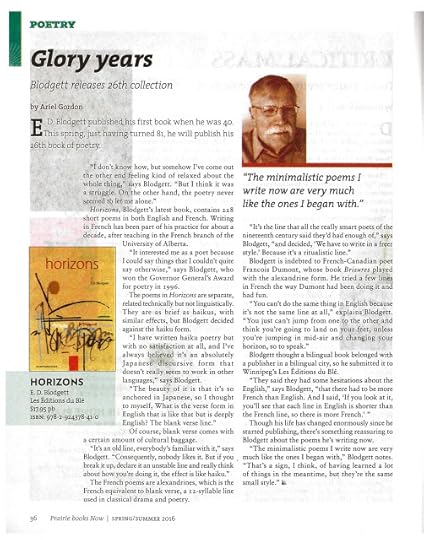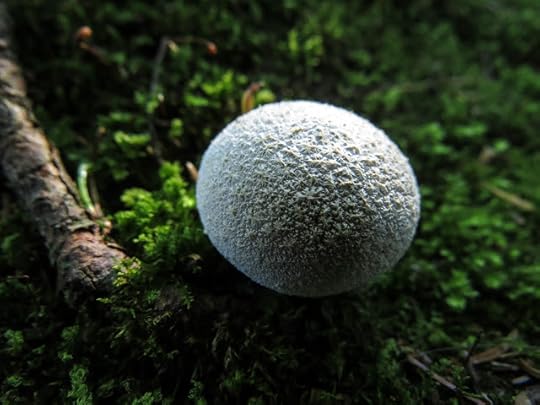Ariel Gordon's Blog, page 8
August 11, 2016
PBN: E.D. Blodgett
Published on August 11, 2016 21:44
August 7, 2016
Breaking waves!
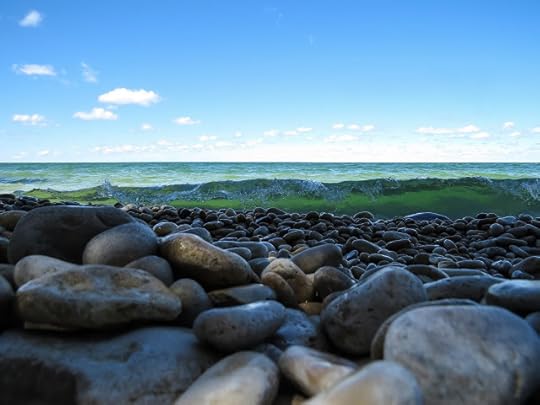
* * *
Just small ones...
From what's called Pebble Beach at the bottom of the Caves Trail at Clearwater Lake PP. (After I took this pic, I stripped down and buoyed around in the green water in my skivvies. Best swim of the entire trip...)
Published on August 07, 2016 13:28
Tiny perfect puffball
Published on August 07, 2016 13:26
Mossy slopes
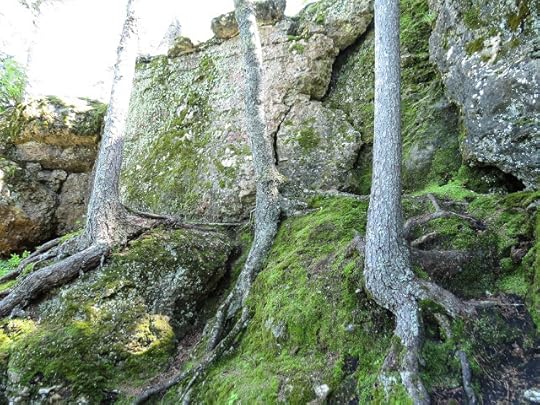
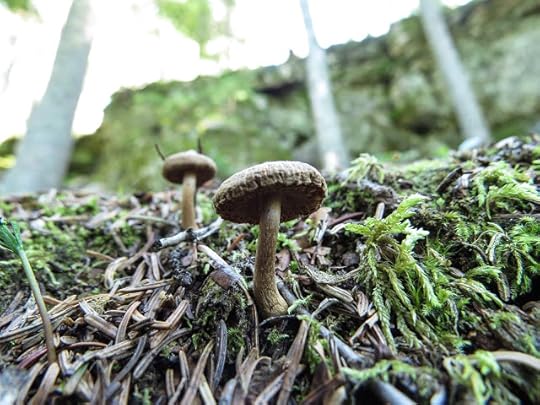
* * *
Again, from my solo walk of the the Caves Trail at Clearwater Lake PP: trees attached to mossy slopes and the teeny-tiny mushrooms at the base of those trees.
Published on August 07, 2016 13:24
Common harebells
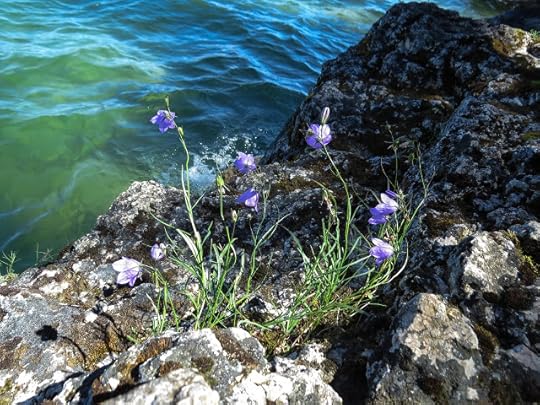

* * *
Two views of the Common Harebells that were all over the Caves Trail at Clearwater Lake PP. The first is a typical clump at the shoreline. The other is from a cave-side and, while it's a terrible photo of the Harebell, it works as a pic of the lichen on the rock behind...
Common Harebells are described as follows in my dog-eared copy of Plants of the Western Boreal Forest & Aspen Parkland: "Do not let the fragile-looking blossoms fool you—harebell is a very hardy plant."
Published on August 07, 2016 13:21
August 5, 2016
Lit-POP-ed
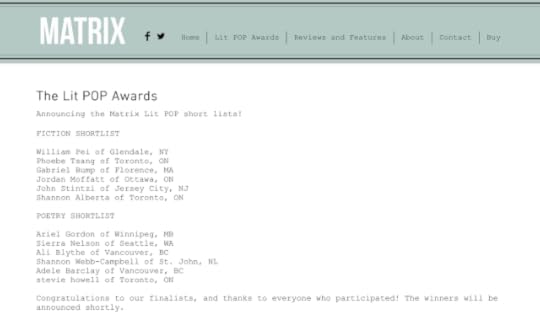
* * *
So I found out today that a poem of mine was shortlisted for this year's Lit POP Award for Poetry.
Aside from my Montreal dreams, I'm happy to see friends and colleagues on the shortlists!
Published on August 05, 2016 13:32
June 12, 2016
Eventful!
From Jenna Butler's FB feed. So good/concise/organized, I had to steal it:
"Thrilled to be readying for a book tour/conference out east with two exceptional poets, Ariel Gordon and Claire Caldwell. We'll be reading at several stops along the route, and we'd love to chat with you if you're in the neighbourhood, friends.

Tuesday June 14, McNally Robinson Booksellers in Winnipeg, 7 pm (Ariel and Jenna)
Friday June 17, BioSci Building, Queen's University in Kingston, 10:45 am, "Spotting Artists in the 'Wild'" panel at the Association for Literature, Environment and Culture in Canada conference (Ariel, Claire, and Jenna)
Saturday June 18, Novel Idea Bookstore in Kingston, 6:30 pm (Ariel, Claire, and Jenna)
Monday June 20, Belljar Cafe/Bar in Toronto, 8 pm, Common Readings: The June Special Translations Edition (Claire, Eric Charlebois, Malcolm Sutton, Jessica Moore, Beatriz Hausner)
Tuesday June 21, Another Story Bookshop in Toronto, 7 pm, "Writing the Environment" (Ariel, Claire, and Jenna)"
"Thrilled to be readying for a book tour/conference out east with two exceptional poets, Ariel Gordon and Claire Caldwell. We'll be reading at several stops along the route, and we'd love to chat with you if you're in the neighbourhood, friends.

Tuesday June 14, McNally Robinson Booksellers in Winnipeg, 7 pm (Ariel and Jenna)
Friday June 17, BioSci Building, Queen's University in Kingston, 10:45 am, "Spotting Artists in the 'Wild'" panel at the Association for Literature, Environment and Culture in Canada conference (Ariel, Claire, and Jenna)
Saturday June 18, Novel Idea Bookstore in Kingston, 6:30 pm (Ariel, Claire, and Jenna)
Monday June 20, Belljar Cafe/Bar in Toronto, 8 pm, Common Readings: The June Special Translations Edition (Claire, Eric Charlebois, Malcolm Sutton, Jessica Moore, Beatriz Hausner)
Tuesday June 21, Another Story Bookshop in Toronto, 7 pm, "Writing the Environment" (Ariel, Claire, and Jenna)"
Published on June 12, 2016 07:35
June 11, 2016
In Conversation: Carmen Aguirre
By Ariel Gordon
Winnipeg Free Press—PRINT EDITION
Carmen Aguirre is a revolutionary artist.
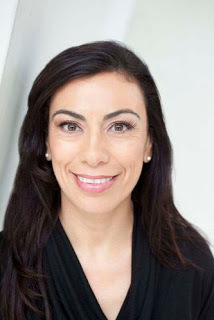 The Vancouver-based writer is a political exile of the 1973 Pinochet coup d’état in Chile, a survivor of the Paper Bag Rapist, and an actress who was warned early in her career she’d mostly be offered "Mexican hooker and Puerto Rican maid roles."
The Vancouver-based writer is a political exile of the 1973 Pinochet coup d’état in Chile, a survivor of the Paper Bag Rapist, and an actress who was warned early in her career she’d mostly be offered "Mexican hooker and Puerto Rican maid roles."
Aguirre will be launching her second memoir, Mexican Hooker #1: And My Other Roles Since the Revolution at McNally Robinson Monday as part of the Winnipeg International Writers Festival’s spring literary series. The event will also feature Chilean-Canadian journalist Claudia Garcia de la Huerta.
Aguirre conducted this interview with Ariel Gordon via email.
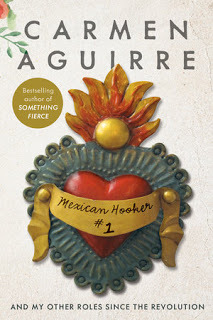 Free Press: Something Fierce, your previous memoir, covered your childhood and early adulthood in Canada, Chile and other South American locales. The Globe and Mail’s Francisca Zentilli called it "an insightful journey into the formation of a revolutionary soul." What made you want to delve into your adult life, as you transitioned from a revolutionary to an artist?
Free Press: Something Fierce, your previous memoir, covered your childhood and early adulthood in Canada, Chile and other South American locales. The Globe and Mail’s Francisca Zentilli called it "an insightful journey into the formation of a revolutionary soul." What made you want to delve into your adult life, as you transitioned from a revolutionary to an artist?
CA: The first memoir was a coming-of-age story set against the backdrop of a political thriller. In it, I explored themes of political commitment clashing with personal desires and living in a state of terror, due to being in the Chilean resistance during the Pinochet dictatorship.
When I toured the first book, the questions that kept coming up from readers were: what happened next, how did you find meaning in your life after living a life so full of meaning as a youth, and how did you heal from the trauma of living in chronic terror due to state terrorism? It was in responding to those questions that I found the material to write the second memoir, which is all about healing and also about finding meaning in an artistic journey.
In choosing the theme of "healing" for my second book, I inevitably felt that I had to include the trauma of being raped as a child and how I healed from that.
That story, the story of the rape, ended up being the through-line, the spine of the book.
It’s the story that we keep going back to, that orbits until it lands in the centre of the narrative and stays there.
FP: Tell me about the hubbub after Something Fierce was nominated for, and then won, CBC Canada Reads in 2012?
CA: To be honest, I had never heard of Canada Reads because I’m not a radio listener. So I didn’t get what a big deal it was until the book made it into the Top 5.
I had also never heard of Shad, because I don’t usually listen to rap.
When I was called a terrorist within the first five minutes of the debate, my whole body froze, and I felt a great deal of fear. I was glad, however, that Shad and I had prepared for that statement and that he was able to handle himself so well when it came up.
I think it brought an important discussion to the forefront, which is: what is a terrorist? Who do we get to call a terrorist? Do we get to call the Jewish resistance during the Warsaw ghetto uprising terrorists?
I was amazed and elated when the book won because it was the dark horse of the five and it tells a story that is not often read by the mainstream.
FP: How is writing memoirs different from writing plays?
CA: Plays are much harder. I think playwriting is the hardest form to write in: it’s very taut, it’s very limiting, and you have to grab the audience immediately and never let them go.
It is through my years of playwriting, at failing miserably at it most of the time and on the odd occasion getting somewhere with it, that I learned to write a book.
I already knew so much about structure, theme, organizing principles, stakes, objectives for the character, conflict. Writing a memoir was easier.
FP: Early in your theatre training at Vancouver’s Studio 58, your instructors told you that you were "entering a racist business where more often than not I would be offered Mexican hooker and Puerto Rican maid roles." Since then, you’ve written or co-written 25 plays and have 80 acting credits, which is a success by any measure. But is the film, television and theatre world any less racist now than when you graduated?
CA: I believe it is less racist, but there are colleagues of mine who believe it’s the same or even worse. I can totally see why they say that. They say that because some people in the theatre, film and TV industries believe that we are now in a post-racial society and that the struggle is therefore over. What this means in practice is that white people are now playing roles of colour because it’s believed that now, "We can all play everything." The problem is that it doesn’t go both ways, so we still have to be vigilant in making sure that actors of colour are actually getting the parts that were not available to us not so long ago. In an ideal world, I do believe anybody can play anything, but we are very far from that. In the current Canadian theatre scene, only 3.7 per cent of women we see on stage are of colour. Of those, almost none are playing lead roles. We clearly have a very long way to go.
FP: What are you reading right now? What are you writing right now?
CA: I am reading Jhumpa Lahiri’s In Other Words and Marlon James’ A Brief History of Seven Killings. And the tabloids. I always salivate over the tabloids, which are my addiction, along with dark chocolate. Right now, I am writing a new play called Anywhere but Here and a novel entitled Three Virgins. Neither is going well.
Ariel Gordon is a Winnipeg writer.
Winnipeg Free Press—PRINT EDITION
Carmen Aguirre is a revolutionary artist.
 The Vancouver-based writer is a political exile of the 1973 Pinochet coup d’état in Chile, a survivor of the Paper Bag Rapist, and an actress who was warned early in her career she’d mostly be offered "Mexican hooker and Puerto Rican maid roles."
The Vancouver-based writer is a political exile of the 1973 Pinochet coup d’état in Chile, a survivor of the Paper Bag Rapist, and an actress who was warned early in her career she’d mostly be offered "Mexican hooker and Puerto Rican maid roles."Aguirre will be launching her second memoir, Mexican Hooker #1: And My Other Roles Since the Revolution at McNally Robinson Monday as part of the Winnipeg International Writers Festival’s spring literary series. The event will also feature Chilean-Canadian journalist Claudia Garcia de la Huerta.
Aguirre conducted this interview with Ariel Gordon via email.
 Free Press: Something Fierce, your previous memoir, covered your childhood and early adulthood in Canada, Chile and other South American locales. The Globe and Mail’s Francisca Zentilli called it "an insightful journey into the formation of a revolutionary soul." What made you want to delve into your adult life, as you transitioned from a revolutionary to an artist?
Free Press: Something Fierce, your previous memoir, covered your childhood and early adulthood in Canada, Chile and other South American locales. The Globe and Mail’s Francisca Zentilli called it "an insightful journey into the formation of a revolutionary soul." What made you want to delve into your adult life, as you transitioned from a revolutionary to an artist?CA: The first memoir was a coming-of-age story set against the backdrop of a political thriller. In it, I explored themes of political commitment clashing with personal desires and living in a state of terror, due to being in the Chilean resistance during the Pinochet dictatorship.
When I toured the first book, the questions that kept coming up from readers were: what happened next, how did you find meaning in your life after living a life so full of meaning as a youth, and how did you heal from the trauma of living in chronic terror due to state terrorism? It was in responding to those questions that I found the material to write the second memoir, which is all about healing and also about finding meaning in an artistic journey.
In choosing the theme of "healing" for my second book, I inevitably felt that I had to include the trauma of being raped as a child and how I healed from that.
That story, the story of the rape, ended up being the through-line, the spine of the book.
It’s the story that we keep going back to, that orbits until it lands in the centre of the narrative and stays there.
FP: Tell me about the hubbub after Something Fierce was nominated for, and then won, CBC Canada Reads in 2012?
CA: To be honest, I had never heard of Canada Reads because I’m not a radio listener. So I didn’t get what a big deal it was until the book made it into the Top 5.
I had also never heard of Shad, because I don’t usually listen to rap.
When I was called a terrorist within the first five minutes of the debate, my whole body froze, and I felt a great deal of fear. I was glad, however, that Shad and I had prepared for that statement and that he was able to handle himself so well when it came up.
I think it brought an important discussion to the forefront, which is: what is a terrorist? Who do we get to call a terrorist? Do we get to call the Jewish resistance during the Warsaw ghetto uprising terrorists?
I was amazed and elated when the book won because it was the dark horse of the five and it tells a story that is not often read by the mainstream.
FP: How is writing memoirs different from writing plays?
CA: Plays are much harder. I think playwriting is the hardest form to write in: it’s very taut, it’s very limiting, and you have to grab the audience immediately and never let them go.
It is through my years of playwriting, at failing miserably at it most of the time and on the odd occasion getting somewhere with it, that I learned to write a book.
I already knew so much about structure, theme, organizing principles, stakes, objectives for the character, conflict. Writing a memoir was easier.
FP: Early in your theatre training at Vancouver’s Studio 58, your instructors told you that you were "entering a racist business where more often than not I would be offered Mexican hooker and Puerto Rican maid roles." Since then, you’ve written or co-written 25 plays and have 80 acting credits, which is a success by any measure. But is the film, television and theatre world any less racist now than when you graduated?
CA: I believe it is less racist, but there are colleagues of mine who believe it’s the same or even worse. I can totally see why they say that. They say that because some people in the theatre, film and TV industries believe that we are now in a post-racial society and that the struggle is therefore over. What this means in practice is that white people are now playing roles of colour because it’s believed that now, "We can all play everything." The problem is that it doesn’t go both ways, so we still have to be vigilant in making sure that actors of colour are actually getting the parts that were not available to us not so long ago. In an ideal world, I do believe anybody can play anything, but we are very far from that. In the current Canadian theatre scene, only 3.7 per cent of women we see on stage are of colour. Of those, almost none are playing lead roles. We clearly have a very long way to go.
FP: What are you reading right now? What are you writing right now?
CA: I am reading Jhumpa Lahiri’s In Other Words and Marlon James’ A Brief History of Seven Killings. And the tabloids. I always salivate over the tabloids, which are my addiction, along with dark chocolate. Right now, I am writing a new play called Anywhere but Here and a novel entitled Three Virgins. Neither is going well.
Ariel Gordon is a Winnipeg writer.
Published on June 11, 2016 12:15
June 9, 2016
middle-aged mushrooms
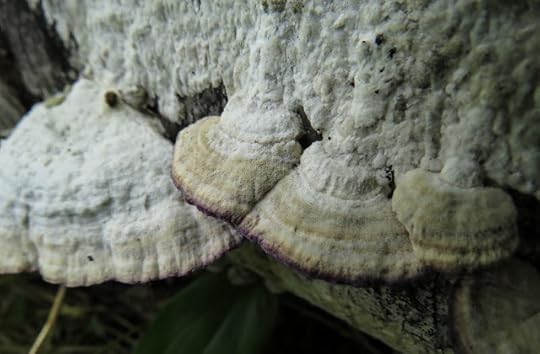
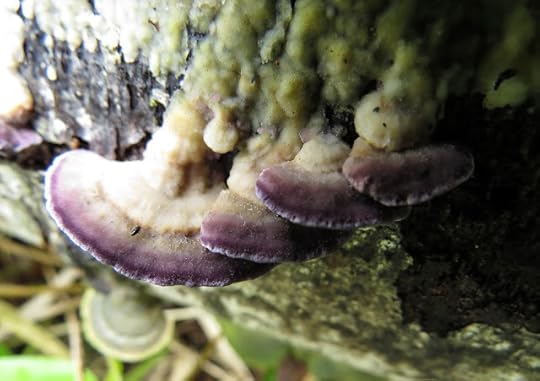
* * *
Purply mushrooms. Bottom pic is from May 28 and the top from June 9. Not the same cluster but on the same log.
So: 12 days apart.
Middle-aged! Mushrooms!
Published on June 09, 2016 12:31
forest coral


* * *
Went for a walk in Assiniboine Forest with a colleague in town for a publishing conference. It had rained the day before/several days in a row, so the forest was boggy in low places/most places.
Which is to say that I walked around said conference for a couple of hours in hiking boots that smelled of bog.
The best part of the walk were the clusters of coral mushrooms that seemed to be everywhere in the forest. The best part was how green everything was. All the different plants in the understory. The shushing of the trembling aspen leaves. My feet in puddles, the bottoms of my pants wicking moisture up.
Published on June 09, 2016 12:26

